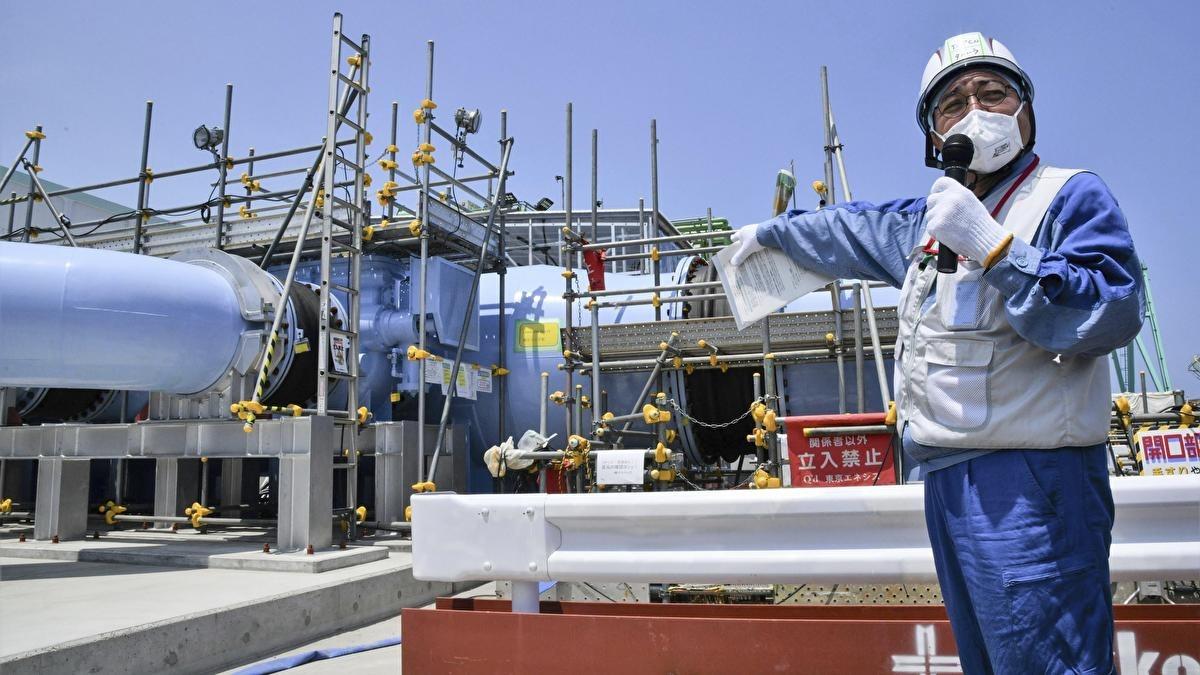 An employee of Tokyo Electric Power Company explains about the facility to be used to release treated radioactive water to media at Fukushima Daiichi nuclear power plant in Fukushima, northern Japan, June 26, 2023. (PHOTO / AP)
An employee of Tokyo Electric Power Company explains about the facility to be used to release treated radioactive water to media at Fukushima Daiichi nuclear power plant in Fukushima, northern Japan, June 26, 2023. (PHOTO / AP)
Philippine environmentalists and fisherfolk are stepping up their campaign against Japan’s plan to dump more than 1 million tons of nuclear-contaminated water into the Pacific Ocean.
Apart from holding protest rallies, Philippine advocacy groups are aiming to raise awareness about the dangers of toxic water discharge by organizing in-person gatherings as well as online forums. They are also seeking an audience with the Philippine Department of Foreign Affairs and the Japanese Embassy so that they can voice out their concerns.
TEPCO’s move was met with opposition from experts, civic groups, and fishery organizations in Japan, South Korea and Pacific Island countries
Pablo Rosales, national chairperson of PANGISDA-Pilipinas, a coalition of small-scale fisherfolk in the Philippines, said even if Japan discharges the contaminated water only into a certain portion of the ocean, there is a big possibility that this will spread out to other bodies of water.
READ MORE: Distrust of Japanese govt, TEPCO is behind Fukushima plan
“We fishermen are familiar with water currents and this discharge can pollute the whole Pacific Ocean,” Rosales said.
He said their group will continuously campaign against anything that will pollute the ocean. Japan’s planned dumping of nuclear wastewater not only threatens the fishing communities’ livelihoods, but also national food security, Rosales said.
The Philippines isa an archipelago and fish is a key protein source for most Filipinos.
The Philippine government is yet to issue a statement on Japan’s plan.
Japan is planning to discharge wastewater from the crippled Fukushima Daiichi nuclear power plant into the sea as early as within August, Kyodo News reported on Aug 7.
Rosales is one of the signatories of a manifesto sent on July 19 by members of the civil society to Philippine Foreign Affairs Secretary Enrique Manalo.
Leaders of fishing communities, youth, environmentalists, the urban poor, and farmers’ groups have urged the Philippine government to oppose the planned dumping of wastewater into the ocean, and ask Japan to work with the Pacific Islands Forum in formulating alternative options for handling the toxic water. They pointed out that the Pacific Ocean accounts for 30 percent of the waters that cover the planet and is the source of about 70 percent of the global fish supply.
The community leaders are “wary” of any publicized claims that the water to be discharged has been treated and considered safe, noting the lack of transparency and data to support the claims.
On June 12, the Tokyo Electric Power Company, or TEPCO, operator of the stricken Fukushima nuclear power plant, started testing the equipment to discharge wastewater from the plant into the Pacific. The water has been used to cool the reactors at the nuclear plant after the Fukushima region was devastated by an earthquake and tsunami in March 2011.
TEPCO’s move was met with opposition from experts, civic groups, and fishery organizations in Japan, South Korea and Pacific Island countries.
Veronica Cabe, coordinator of the Nuclear and Coal-Free Bataan Movement, said the planned discharge can exacerbate marine pollution in the region. And this pollution is already reducing the supply of food.
According to a study published in April in the Journal of Marine Science and Engineering, the Southeast Asian region is the world’s most polluted area in terms of marine plastic. The Mekong River, one of the largest rivers in the region is one of the biggest contributors to plastics in the world’s oceans. Philippine and Indonesian coastlines are most exposed to plastic pollution from the Mekong River.
Cabe said the discharge will potentially harm global marine resources, affecting food supply. Meanwhile, the problem posed by the dumping of Fukushima wastewater should push the Philippine government to reconsider its plan to operate a mothballed nuclear plant in the northern Philippine province of Bataan, she said.
READ MORE: Fukushima plan a nuclear threat to Asia-Pacific
Cabe said that environmentalists and other advocacy groups are highlighting at various forums the Fukushima experience and how such issue can also arise in the Philippines. If Japan, a developed country, cannot dispose its contaminated water properly, how can a developing country like the Philippines handle a similar problem, she said.
Cabe said the Fukushima case illustrates that enhancing nuclear power is not the “safe” way for the Philippines to boost the use of renewable energy.
“If we want to transition (from coal to renewable energy sources), we need nuclear-free transition. We need a safe and sustainable source of (clean) energy,” she said.
Contact the writer at prime@chinadailyapac.com


